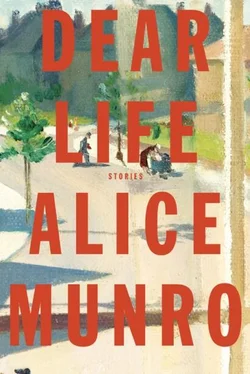Those great leafy trees above them. You could not see any stars. But some shine on the water, between wherever they were and the city lights.
“Just sit and consider,” he said.
She was enraptured by the word.
“Consider.”
“How you’re going to walk into the house, for instance. Can you manage dignified? Don’t overdo it. Nonchalant? I presume you have a husband.”
“I will have to thank you first for driving me home,” she said. “So you will have to tell me your name.”
He said that he had already told her that. Possibly twice. But once again, okay. Harris Bennett. Bennett. He was the son-in-law of the people who had given the party. Those were his children, passing out the drinks. He and they were visiting from Toronto. Was she satisfied?
“Do they have a mother?”
“Indeed they do. But she is in a hospital.”
“I’m sorry.”
“No need. It’s quite a nice hospital. It’s for mental problems. Or you might say emotional problems.”
She hurried on to tell him that her husband was named Peter and that he was an engineer and that they had a daughter named Katy.
“Well that’s very nice,” he said, and started to back out.
On Lions Gate Bridge he said, “Excuse me for sounding how I did. I was thinking whether I would or wouldn’t kiss you and I decided I wouldn’t.”
She thought he was saying that there was something about her that didn’t quite measure up to being kissed. The mortification was like being slapped clean back into sobriety.
“Now when we get over the bridge do we go right on Marine Drive?” he continued. “I’ll rely on you to tell me.”
During the coming fall and winter and spring there was hardly a day when she didn’t think of him. It was like having the very same dream the minute you fell asleep. She would lean her head against the back pillow of the sofa, thinking that she lay in his arms. You would not think that she’d remember his face but it would spring up in detail, the face of a creased and rather tired-looking, satirical, indoor sort of man. Nor was his body lacking, it was presented as reasonably worn but competent, and uniquely desirable.
She nearly wept with longing. Yet all this fantasy disappeared, went into hibernation when Peter came home. Daily affections sprang to the fore then, reliable as ever.
The dream was in fact a lot like the Vancouver weather—a dismal sort of longing, a rainy dreamy sadness, a weight that shifted round the heart.
So what about the rejection of kissing, that might seem an ungallant blow?
She simply cancelled it out. Forgot about it entirely.
And what about her poetry? Not a line, not a word. Not a hint that she had ever cared for it.
Of course she gave these fits houseroom mostly when Katy was napping. Sometimes she spoke his name out loud, she embraced idiocy. This followed by a scorching shame in which she despised herself. Idiocy indeed. Idiot.
Then a jolt came, the prospect then certainty of the job at Lund, the offer of the house in Toronto. A clear break in the weather, an access of boldness.
She found herself writing a letter. It didn’t begin in any conventional way. No Dear Harris. No Remember me.
Writing this letter is like putting a note in a bottle—
And hoping
It will reach Japan .
Nearest thing to a poem in some time.
She had no idea of an address. She was bold and foolish enough to phone the people who had given the party. But when the woman answered her mouth went dry and felt as big as a tundra and she had to hang up. Then she carted Katy over to the public library and found a Toronto phone book. There were lots of Bennetts but not a single Harris or H. Bennett.
She had a shocking idea then, to look in the obituaries. She couldn’t stop herself. She waited till the man reading the library copy was finished. She did not see the Toronto paper usually because you had to go over the bridge to get it, and Peter always brought home the Vancouver Sun . Rustling through its pages finally she found his name at the top of a column. So he was not dead. A newspaper columnist. Naturally he would not want to be bothered with people calling him by name, at home.
He wrote about politics. His writing seemed intelligent but she did not care anything about it.
She sent her letter to him there, at the newspaper. She could not be sure that he opened his own mail and she thought that putting Private on the envelope was asking for trouble, so she wrote only the day of her arrival and the time of the train, after the bit about the bottle. No name. She thought that whoever opened the envelope might think of an elderly relative given to whimsical turns of phrase. Nothing to implicate him, even supposing such peculiar mail did get sent home and his wife opened it, being now out of the hospital.
Katy had evidently not understood that Peter’s being outside on the platform meant that he would not be travelling with them. When they began to move and he didn’t, and when with gathering speed they left him altogether behind, she took the desertion hard. But she settled down in a while, telling Greta that he would be there in the morning.
When that time came Greta was apprehensive, but Katy made no mention at all of the absence. Greta asked her if she was hungry and she said yes, then explained to her mother—as Greta had explained to her before they ever got on the train—that they now had to take off their pajamas and look for their breakfast in another room.
“What do you want for breakfast?”
“Crisp peas.” That meant Rice Krispies.
“We’ll see if they have them.”
They did.
“Now will we go and find Daddy?”
There was a play area for children but it was quite small. A boy and a girl—a brother and sister, by the looks of their matching bunny-rabbit outfits—had taken it over. Their game consisted of running small vehicles at each other then deflecting them at the last moment. CRASH BANG CRASH.
“This is Katy,” Greta said. “I’m her mom. What are your names?”
The crashing took on more vehemence but they didn’t look up.
“Daddy isn’t here,” said Katy.
Greta decided that they had better go back and get Katy’s Christopher Robin book and take it up to the dome car and read it. They wouldn’t be likely to bother anybody because breakfast wasn’t over and the important mountain scenery hadn’t started.
The problem was that once she finished Christopher Robin, Katy wanted it started again, immediately. During the first reading she had been quiet, but now she began chiming in with ends of lines. Next time she chanted word for word though still not ready to try it by herself. Greta could imagine this being an annoyance to people once the dome car filled up. Children Katy’s age had no problem with monotony. In fact they embraced it, diving into it and wrapping the familiar words round their tongues as if they were a candy that could last forever.
A boy and a girl came up the stairs and sat down across from Greta and Katy. They said good morning with considerable cheer and Greta responded. Katy rather disapproved of her acknowledging them and continued to recite softly with her eyes on the book.
From across the aisle came the boy’s voice, almost as quiet as hers:
They’re changing guard at Buckingham Palace—
Christopher Robin went down with Alice.
After he finished that one he started another. “‘I do not like them, Sam-I-am.’”
Greta laughed but Katy didn’t. Greta could see that she was a bit scandalized. She understood silly words coming out of a book but not coming out of somebody’s mouth without a book.
“Sorry,” said the boy to Greta. “We’re preschoolers. That’s our literature.” He leaned across and spoke seriously and softly to Katy.
Читать дальше












